By Li Shouen, CCTV.com reporter
Editor's Note: CCTV.com Panview presents 'China Cares' — series of special coverage on China's rural reforms, charities and comprehensive efforts to help those in poverty unlock their potential for success.
While talking about China nowadays, what pops up into people’s minds might be its modern metropolises, such as Beijing, Shanghai and Shenzhen, and etc., or coastal provinces that enjoy a more vibrant economy.
Yet, China is a nation with imbalanced development, where the vast western region, especially southwestern provinces remain far less developed. But through the support of governments at various levels, they are catching up, while there are still people in need of help for various reasons.
And local communities can play an important role here to help those in need. Let's take the Guanshanhu Community of Guiyang, capital city of southwestern Guizhou Province as an example and see how they make life easier for people living there.
Caring homes for seniors
Statistics shows senior people aging above 60 account for about 12.3% of the total 265,000 people living in Guanshanhu Community as of the end of 2016. There are more than 20 caring homes and daily care centers, either public ones or private ones that provide more than 1,000 beds.
The number does not look impressive, but considering China's traditional culture of respecting elders, which means seldom do families choose to send their old folks to caring homes. Hence, the percentage of a bed per 3 senior citizens is rather high.
The Guanshanhu Community Senior Care Center is a professional senior caring house, subsidized by the local government but led by a senior care enterprise, which comes equipped with modern health checks and medical treatment systems and personnel that cover an area of 200 mu, or some 130 thousand square meters, providing more than 300 ordinary beds for senior care, and another 120 beds for medical care.
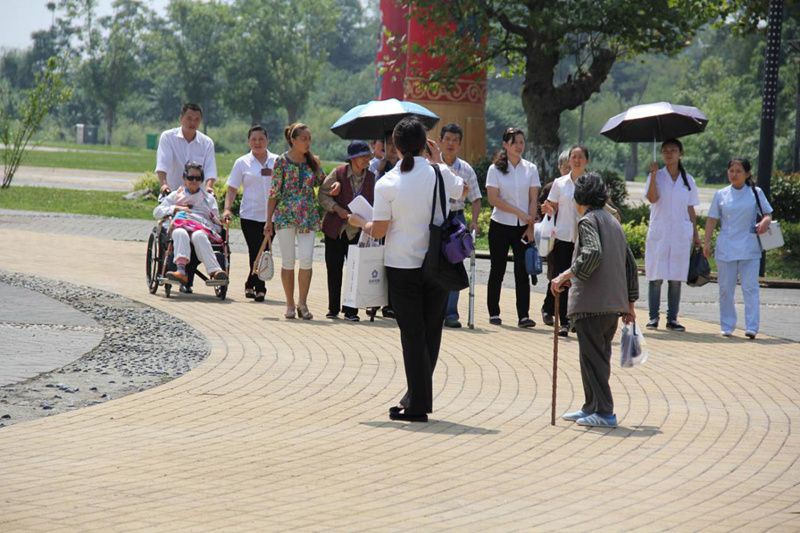
(Seniors of Guanshanhu Community Senior Care Center taking a walk in nearby park)
Seniors, either sent to the center for better cares by professional staff by their families, or choosing to stay at a caring center on their own account, not only enjoy professional caring, but also have much companionship of their peers.
To entertain seniors, the Center occasionally invites different performing groups to perform for them. The seniors get chances to visit nearby parks, accompanied by caring and medical staff. Playing chess, or cards, or making Jiaozi by themselves, are in their daily leisure lists.
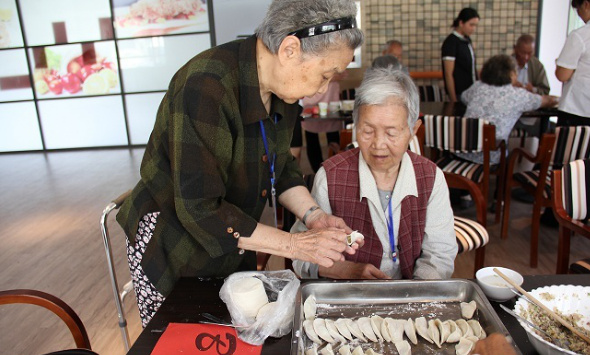
(Seniors of Guanshanhu Community Senior Care Center making dumplings (Jiaozi))
Seniors can enjoy a better-quality later life, and their children are released from sparing too much time to take care of their old folks. So, more seniors have accepted it now in China, especially when the nation is witnessing an increase elderly population.
Raising up hopes for the future
Children are the future pillars of a nation. It's our responsibility to provide a better environment including living conditions, education, entertainment, and protect them from harm, physically or psychologically.
In China, due to its imbalanced development, some young parents, especially those from underdeveloped rural areas migrate to big cities to seek better opportunities to earn a living. Yet they cannot afford to bring along their kids, since they have no time to take care of them and it’s difficult for their kids to get educated in big cities. Accordingly, “the left-behind children” are usually left to their grandparents in their villages.
There are dozens of left-behind children in villages administrated under the Guanshanhu Community. In Dec. 2015, the Caring Center for Left-behind Children was put into use in Pingqiao village, Zhuchang County.
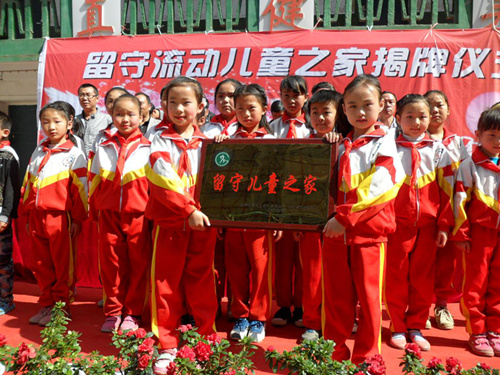
(In Dec. 2015, the Caring Center for Left-behind Children was put into use in Pingqiao village, Zhuchang County.)
Free books are provided for children to enjoy them after school time; Long-distance call service and computers have been installed with video-chatting software to enable kids to call and chat with their parents; kids can even receive psychological consultations; staff members and volunteers also organize lectures to teach them common sense in self-protection or share the wisdom they can not learn from school.
Local enterprises are also encouraged to donate clothes, daily necessities, medical and first-aid supplies and stationery for the children. Such donations also cover other preschool children in the Guanshanhu Community. In Sept. 2016, charity activities were organized by the community and enterprises donated 2700 sets of bedding articles valuing RMB1.1 million, or some US$170 thousand to 9 local kindergartens.
Bridging ex-servicemen with civilian life
The resettlement of ex-servicemen is becoming a social issue globally, having aroused the attention of governments worldwide. For ex-servicemen, their main grievance is the challenge of settling back into civilian life. And the first step would be finding employment.
In China, basically, the people's governments at or above the county level shall be responsible for helping ex-servicemen to find employment commensurate with their ranks of posts, contributions and specialties.

(Home for Ex-Servicemen, where they can gather to get training and consultation etc. )
But, most specific work is carried at the community level. In Guanshanhu Community, the local government has provided professional training for more than 100 ex-servicemen in 2017 according to their preferences. Most of them have found gainful employment, while some have chosen to go back to colleges or universities for further studies and others have started their own businesses.
Local governments also help ex-servicemen to find jobs for their spouses or assist their children get enrolled into kindergarten or primary schools.
Non-government volunteers offer helping hands
As the overall living conditions in China have improved dramatically in the past few decades, people are more willing to volunteer. Although the local government has increased efforts to help those in need, there are other people who might not be in very severe conditions but still require assistance. A volunteer service can fill in the gap.
According to statistics, there are more than 40,000 registered volunteers in Guanshanhu Community. They provide volunteer services to different people based on their career backgrounds or interests.
Doctors might give free lectures about maintaining a healthy diet or how to build up your body in a more scientific method, or offer free medical check-ups or even at-home medical treatment for local senior citizens on weekends. Lawyers might offer free consultations or give free lectures to explain basic knowledge on laws and regulations. Retired seniors might patrol neighborhoods to stay vigilant against crimes.
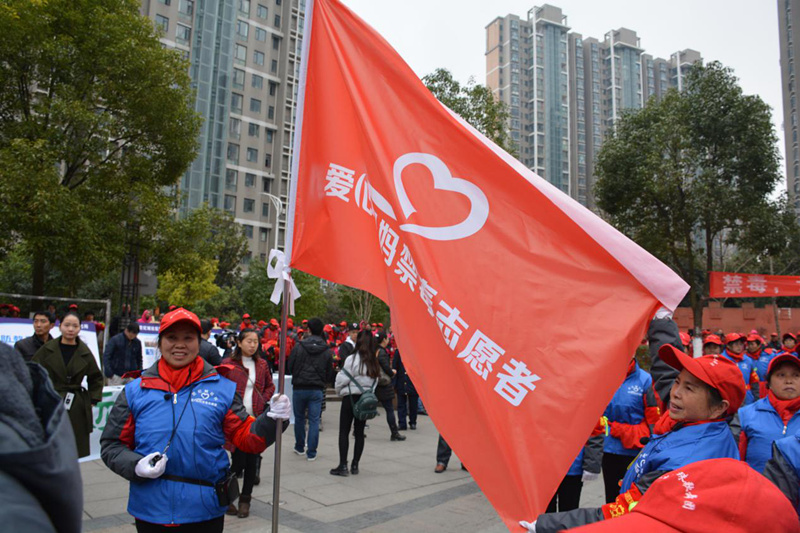
(Volunteers publicizing on prohibition of drug use to locals)
Yang Zhaoqun, a retired lady in her late 60s, is one of the registered volunteers in Guanshanhu Community. Shortly after her retirement, she started her own business and everything went smoothly until her mother got paralyzed after a serious ailment about 6 years ago.
While she wheeled her mother out for a walk one evening at a neighborhood square, she danced for her mother. Some senior citizens who were also doing exercises felt attracted to her elegant dancing postures. They invited her to be their teacher.
Afterwards, Yang transformed her life. At the very beginning, she just had 10 “students,” but within 6 years, the Pearl Dancing Troupe has around 5,000 followers.
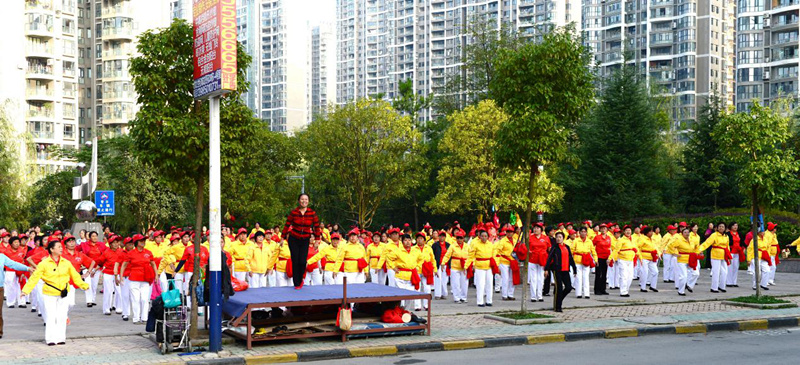
(Yang Zhaoqun leading a dance with her troupe members for morning exercises)
She teaches them dancing, organizes them to participate in various activities, including volunteer services. With the help of her and other members in the troupe, senior citizens who previously feel lonely are now enjoying a happier life in their golden years.
(The opinions expressed here do not necessarily reflect the opinions of Panview or CCTV.com. )

Panview offers a new window of understanding the world as well as China through the views, opinions, and analysis of experts. We also welcome outside submissions, so feel free to send in your own editorials to "globalopinion@vip.cntv.cn" for consideration.
















